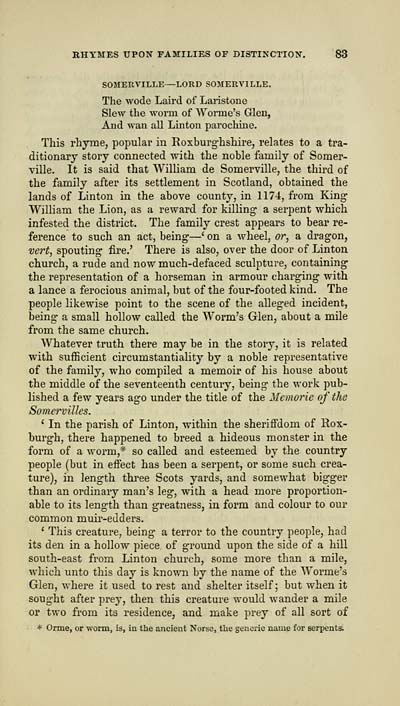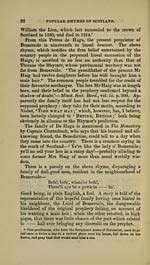Download files
Complete book:
Individual page:
Thumbnail gallery: Grid view | List view

RHYMES UPON FAMILIES OF DISTINCTIOTST. 83
SOMERVILLE — LORD SOMERVILLE.
The wode Laird of Laristone
Slew the worm of Woi-me's Glen,
And wan all Linton parochine.
This rhyme, popular in Roxburg-hshire, relates to a tra-
ditionary story connected with the noble family of Somer-
ville. It is said that William de Somerville, the third of
the family after its settlement in Scotland, obtained the
lands of Linton in the above county, in 1174, from King-
William the Lion, as a reward for killing- a serpent which
infested the district. The family crest appears to bear re-
ference to such an act, being — ' on a wheel, or, a dragon,
vert, spouting fire.' There is also, over the door of Linton
church, a rude and now much-defaced sculpture, containing
the representation of a horseman in armour charging with
a lance a ferocious animal, but of the four-footed kind. The
people likewise point to the scene of the alleged incident,
being a small hollow called the Worm's Glen, about a mile
from the same church.
Whatever truth there may be in the story, it is related
with sufficient circumstantiality by a noble representative
of the family, who compiled a memoir of his house about
the middle of the seventeenth century, being the work pub-
lished a few years ago under the title of the Memorie of the
Somervilles.
' In the parish of Linton, within the sheriffdom of Rox-
burgh, there happened to breed a hideous monster in the
form of a worm,* so called and esteemed by the country
people (but in effect has been a serpent, or some such crea-
ture), in length three Scots yards, and somewhat bigger
than an ordinary man's leg, with a head more proportion-
able to its length than greatness, in form and colour to our
common muir-edders.
' This creature, being a terror to the country people, had
its den in a hollow piece of ground upon the side of a hill
south-east from Linton church, some more than a mile,
which unto this day is known by the name of the Worme's
Glen, where it used to rest and shelter itself; but when it
sought after prey, then this creature would wander a mile
or two from its residence, and make prey of all sort of
* Orme, or worm, is, in the ancient Norse, the generic name for serpents.
SOMERVILLE — LORD SOMERVILLE.
The wode Laird of Laristone
Slew the worm of Woi-me's Glen,
And wan all Linton parochine.
This rhyme, popular in Roxburg-hshire, relates to a tra-
ditionary story connected with the noble family of Somer-
ville. It is said that William de Somerville, the third of
the family after its settlement in Scotland, obtained the
lands of Linton in the above county, in 1174, from King-
William the Lion, as a reward for killing- a serpent which
infested the district. The family crest appears to bear re-
ference to such an act, being — ' on a wheel, or, a dragon,
vert, spouting fire.' There is also, over the door of Linton
church, a rude and now much-defaced sculpture, containing
the representation of a horseman in armour charging with
a lance a ferocious animal, but of the four-footed kind. The
people likewise point to the scene of the alleged incident,
being a small hollow called the Worm's Glen, about a mile
from the same church.
Whatever truth there may be in the story, it is related
with sufficient circumstantiality by a noble representative
of the family, who compiled a memoir of his house about
the middle of the seventeenth century, being the work pub-
lished a few years ago under the title of the Memorie of the
Somervilles.
' In the parish of Linton, within the sheriffdom of Rox-
burgh, there happened to breed a hideous monster in the
form of a worm,* so called and esteemed by the country
people (but in effect has been a serpent, or some such crea-
ture), in length three Scots yards, and somewhat bigger
than an ordinary man's leg, with a head more proportion-
able to its length than greatness, in form and colour to our
common muir-edders.
' This creature, being a terror to the country people, had
its den in a hollow piece of ground upon the side of a hill
south-east from Linton church, some more than a mile,
which unto this day is known by the name of the Worme's
Glen, where it used to rest and shelter itself; but when it
sought after prey, then this creature would wander a mile
or two from its residence, and make prey of all sort of
* Orme, or worm, is, in the ancient Norse, the generic name for serpents.
Set display mode to: Large image | Transcription
Images and transcriptions on this page, including medium image downloads, may be used under the Creative Commons Attribution 4.0 International Licence unless otherwise stated. ![]()
| Early Gaelic Book Collections > J. F. Campbell Collection > Popular rhymes of Scotland > (91) |
|---|
| Permanent URL | https://digital.nls.uk/81375686 |
|---|
| Description | Volumes from a collection of 610 books rich in Highland folklore, Ossianic literature and other Celtic subjects. Many of the books annotated by John Francis Campbell of Islay, who assembled the collection. |
|---|
| Description | Selected items from five 'Special and Named Printed Collections'. Includes books in Gaelic and other Celtic languages, works about the Gaels, their languages, literature, culture and history. |
|---|

